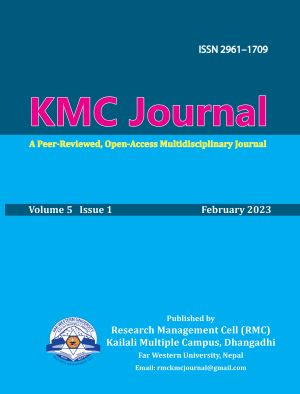Deep Ecological Consciousness and Interconnectedness between Humans and Nature in Thoreau’s Poems
DOI:
https://doi.org/10.3126/kmcj.v5i1.52453Keywords:
Ecocriticism, environment, transcendentalism, biocentricAbstract
Deep ecological criticism emphasizes the biocentric approach to analyze the literary texts, whereas the anthropocentric approach is human-centric. Therefore, the major purpose of this study is to bring balance to the ecosystem between humans and nature by analyzing Thoreau’s poetry from a biocentric point of view. It relooks radically the relationship between humans and nature on deeper level because the extreme human-centric development has been inviting many ecological crises. Therefore, this paper critically discusses, analyzes, and interprets Henry David Thoreau’s selected poems from a deep ecological perspective to explore the deep ecological consciousness and interconnectedness between humans and nature. Deep ecology is a new perception against anthropocentric ideas, which proposes a new solution and visualizes the inexorable current ecological challenges. Thoreau is a transcendentalist poet, his poetry expresses the profound interconnectedness between humans and nature which is unexplored, yet richly found in his poems. His poems express the wisdom of humans’ inner experience with nature and longing for harmony with nature. Consequently, the present paper will contribute to strengthening the relationship among all biospheres, thereby raising human ecological consciousness and increasing climate resilience.
Downloads
Downloads
Published
How to Cite
Issue
Section
License
Copyright (c) 2023 Rupsingh Bhandari

This work is licensed under a Creative Commons Attribution-NonCommercial 4.0 International License.
This license allows reusers to distribute, remix, adapt, and build upon the material in any medium or format for noncommercial purposes only, and only so long as attribution is given to the creator.




